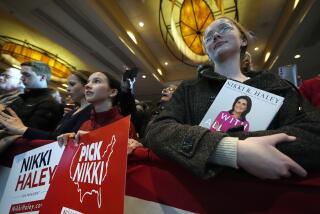Watch the Republicans for the Main Event : Politics: As the Democrats nit-pick their way through New Hampshire, Buchanan is firing up the spoiler role.
- Share via
If the mannerly and oh-so-decorous debate among Democratic presidential hopefuls in New Hampshire proved anything, it was that the real sparks being struck are not in the wet kindling of the Tweedledum-and-Tweedledee party out of power, but in the ranks of the GOP.
Choice is what the voters always say they want, and they have it in abundance in the primaries that pit right-wing polemicist Pat Buchanan against George Bush. For starters, there is the contrast between the President’s instinctive embrace of Eastern Establishment Republican internationalism and Buchanan’s view that it’s so much globaloney. Buchanan has called into question a range of matters, from the wisdom of continued liberal immigration policies to secularism in American public life. The President’s fumbling embrace of pluralism and diversity seem, in contrast to Buchanan’s roars of defiance, the most precious decoction of liberal academic political correctness.
With all of this thunder on the Republican side, the Democrats have unholstered their popguns for another circular firefight over arcane policy distinctions. The unsung hero of the campaign may be former California Gov. Edmund G. (Jerry) Brown Jr., who has provided the few moments of comic relief with his proposal to substitute a flat tax for the current graduated tax.
Sunday’s debate in New Hampshire was better exemplified by the usual Democratic nit-picking about whether a middle-class tax cut would make good sense in terms of stimulating the economy. It played itself out in an almost metaphysical discussion over Arkansas Gov. Bill Clinton’s proposal for a $350 annual tax break for the middle class, which, former Sen. Paul Tsongas observed, is less than a dollar a day. As a debating point, it was about as productive as arguing whether it is better to drink a quart of gin a day and get really plastered or have a cocktail a day for a week and get a mild buzz.
That the debate has been so much more engrossing on the GOP side is really not so surprising. Recall the primary campaign of 1968, when the party occupying the White House saw a dissident come out from the fringe to take on the President. The real action and drama that year was all on the side of the incumbent party, starting in New Hampshire, where Sen. Eugene McCarthy roughed up President Lyndon Johnson. Two months later, Johnson had dropped out and Sen. Robert Kennedy was in, elbowing McCarthy out. It was a battle down to the wire in California in the fateful triumph of Kennedy over Hubert Humphrey.
The Democrats almost had a replay in 1980, when Sen. Edward M. Kennedy challenged President Jimmy Carter in another fratricidal encounter. The GOP contest that year was far less engrossing and had Ronald Reagan’s name written on it from the very beginning.
Now it is the Republicans’ turn, and this year’s Bush-Buchanan matchup is a classic example of the fact that in American politics it is often the debate within the dominant party that is more interesting and even more decisive than what occurs in the party out of power.
Having established the Republicans as the dominant party at the presidential level, Ronald Reagan also established the winning coalition in America politics--the often uneasy but powerful partnership of economic conservatives and social conservatives. This American Likud consists of one group of voters obsessed with prayer and abortion and another with capital gains tax cuts. By poking into the sensitive interstices between these two groups with his relentless attacks on free trade and musings about the essentially Christian character of American life, Buchanan threatens not only Bush’s incumbency but the future of the Republicans as the presidential party.
If a Democrat wins the White House in November, it may be less the product of his own political ingenuity than of the civil war in the other party. Buchanan, playing the role of agent-provocateur, may turn into the advance agent of a Democratic comeback. Should that happen, it will be the greatest unintentional favor to a political adversary since George Wallace’s diversion of Democratic votes delivered the White House to Richard Nixon in 1968.
So, if the Democrats’ debates seem bland and obscure, perhaps it’s just a mark of their political astuteness. After all, if you see a man getting mugged, the best way to hold on to your own wallet may be to appear as inconspicuous as possible.
More to Read
Get the L.A. Times Politics newsletter
Deeply reported insights into legislation, politics and policy from Sacramento, Washington and beyond. In your inbox twice per week.
You may occasionally receive promotional content from the Los Angeles Times.










